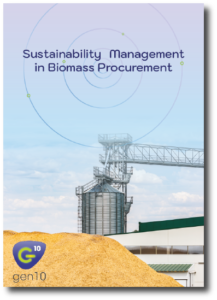Sustainability is one of the main challenges faced across the biomass supply chain. Savvy consumer demand and political influence impact on this sector more than possibly any other commodity, and a breakdown in traceability can mean both reputational damage and the withdrawal of critical subsidies. Due to the serious nature of these traceability risks, meeting sustainability reporting requirements can be one of the more onerous tasks facing stakeholders in the biomass supply chain.
The use of lifecycle CO2 emissions to determine subsidies in countries such as the UK means that to qualify for subsidies, biomass suppliers must have an audit trail of emissions throughout the supply chain; from harvesting, through processing and transport. The UK is one of the major importers of biomass wood pellets, and UK biomass subsidies already require compliance with lifecycle emissions. These standards will become more exacting for plants commissioned from April 2021 onwards, reducing to 29kg CO2/MWh, compared with the 285kg CO2/MWh permitted for most stations until 2020.
On top of lifecycle emissions, there are sustainability certificates including Green Gold Label and Sustainable Biomass Partnership standards to consider, as well as ensuring that products meet the ISO standards for solid biofuels.
Sustainability is an area that biomass traders and buyers cannot afford to get wrong, but with so many potential risks to control, the challenge lies in incorporating sustainability governance into the everyday flow of work without creating a significant impact on business productivity.
Is technology the answer?
If you are active in the biomass supply chain, technology is likely already playing a vital role in your sustainability reporting and certificate management. However, most biomass organisations we speak to are not yet realising the full benefits of commodity management technology. Technology designed for the biomass supply chain can help organisations not only speed up this reporting, but help you build compliance into the everyday activities of your teams and reduce the risk of errors and omissions.
For example, Gen10’s Contract.Manager app can ensure that no contracts are approved, and that no shipments are arranged until all the necessary documentation and certificates are attached. You can also manage certificates within the system with automated expiration reminders for proactive compliance. The app provides a comprehensive audit trail and includes integrations to your other software, including planning, logistics and reporting so that you have full visibility of all documentation and the risk of human error is reduced through automated information flows between your different systems.
Using technology to support compliance can help your organisation process transactions faster, meaning that traders can capitalise on more opportunities and that producers and power generators have a consistent supply chain. If you currently rely on contracts going through approval after creation, you know how this process can create inefficiencies. This can be rapidly accelerated by creating a series of pre-approved contract templates that don’t need to be approved after each contract is created, freeing up Legal, Finance and Sustainability teams to focus on tasks that can add more value to your business.
There will always be aspects of the workflow that rely on collaboration between your teams, and this can also be better managed through the right technology. Contract.Manager allows you to automatically progress contracts to the next team for approval without the need for email, with automated reminders and deadlines to ensure every contract is processed on time. This means there is less risk of emails being overlooked or forgotten and other team members are aware and able to respond if the nominated person is not available.
Collaborating for supply chain sustainability
Sustainability is a challenge for the entire supply chain and is therefore easier to solve when the supply chain works together. Technology can help you accelerate your onboarding and KYC processes, as well as automate the flow of information between your own and other stakeholders’ systems, saving time and reducing errors.
Commodity management apps can allow your suppliers or partners to answer any due diligence questions you have and upload their certification documents. The best technology, such as Gen10’s Aud.IT app, can also integrate with your commodity management system to create a seamless onboarding process with automated data-sharing.
Other collaboration tools Gen10 offer for biomass include the ability to automatically issue documents including requests for release to banks, warehouses, shipping and insurance companies, and secure API integrations with your existing software. Given the importance of sample management for ISO standards, Gen10 also offer collaborative apps that can be used by laboratories and inspection companies. Our commodity management and contract management apps connect to these apps and have a wide range of customisable assays that can be automatically added to invoicing and notify you immediately if the assay is outside your acceptance limits.
The ecosystem approach
Managing sustainability effectively requires collaboration not only between stakeholders in the supply chain but also between the technologies involved. This is why Gen10 take a collaborative app-based approach to commodity management. Each app solves a specific problem within the biomass supply chain and is designed with maximum flexibility to work with your existing workflows and technology. You can choose to implement one app over a period of a few weeks to solve a specific problem, or build a comprehensive solution, based on your needs and existing technology.
Our apps integrate with your own and other stakeholders’ technology to create a secure, collaborative technology ecosystem where traceability is simple. Collaborating for visibility and traceability means that sustainability is easier than ever to prove, and the risk of accidental policy breaches is greatly reduced, all whilst improving the speed, efficiency and therefore profitability of your operations.
If you found this blog useful, you may also be interested in this eBook exploring sustainability in biomass procurement in more depth.
Want to read more?
Subscribe now for monthly updates
By submitting your details you agree that we can store your data and communicate with you. You can opt out of these communications at any time. Read all in our Privacy Policy.




